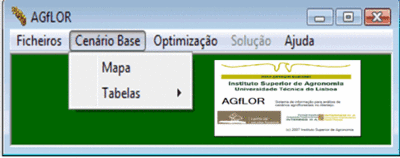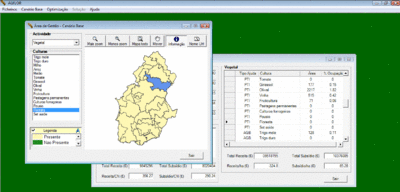Agflor
Wiki quality control
| Has flag | N/A |
|---|
Name, responsible organisation and contact person
| Has full name | Agro-forestry decision support system |
|---|---|
| Has acronym | Agflor |
| Has wiki contact person | Jose Borges |
| Has wiki contact e-mail | joseborges@isa.utl.bt |
Software identification
| Has software | Agflor.Software |
|---|
Description
| Has description | It is a tool to help access the impacts of policy changes on regional land use patterns. It was used by Portuguese Ministry of Agriculture Regional Office of Alentejo (DRAPAL) to assess the impacts of common agricultural policy changes on agricultural and forestry activities on regional land use patterns over an area extending over 2 million hectares. |
|---|---|
| Has modelling scope | Economical indicators, Forest indicators, Social indicators |
| Has temporal scale | Long term (strategic) |
| Has spatial context | Spatial with neighbourhood interrelations |
| Has spatial scale | Regional/national level |
| Has objectives dimension | Multiple objectives |
| Has related DSS | Agflor |
| Has goods and services dimension | Market non-wood products, Market wood products |
| Has decision making dimension | More than one decision maker |
| Has forest management goal | afforestation management, economic evaluation |
| Supports tree species | the model does not specifies any tree species in particular and thus is applicable for variety of tree species. |
| Supports silvicultural regime | agroforestry |
Concrete application
| Has typical use case | The current model has been applied to an area extending over 2 million hectares. |
|---|---|
| Has user profile | national forest administration, local communities, local administration |
| Has country | Portugal |
| Has references about examples of application | |
| Has number of users | N/A |
| Has number of real-life applications | N/A |
| Has utilisation in education | N/A |
| Has research project reference | Borges, P. J., R. Fragoso, J. Garcia-Gonzalo, J. G. Borges, S. Marques & Lucas, M. R. 2010. Assessing impacts of Common Agricultural Policy changes on regional land use patterns with a decision support system: An application in Southern Portugal, Forest Policy and Economics, 12 (2): 111–120, DOI: 10.1016/j.forpol.2009.09.002. Available online at http://www.sciencedirect.com/science/article/pii/S1389934109001178 |
| Has tool dissemination |
Decision support techniques used in the DSS
| Has decision support techniques | Agflor.Decision support techniques |
|---|
Support of Knowledge Management
| Has knowledge management processes | Agflor.Knowledge management process |
|---|
Support of social participation
| Has support for social participation | Agflor.Support of social participation |
|---|
DSS development
| Has DSS development | Agflor.Description of DSS development |
|---|
Documentation
| Has website | |
|---|---|
| Has online demo | |
| Has manual | Yes |
| Has technical documentation | No |
| Has reference | Borges P.J., Fragoso R., Garcia-Gonzalo J., Borges J. G., Marques S. and Lucas, M.R. 2009. Assessing impacts of Common Agricultural Policy changes on regional land use patterns with a decision support system. An application in Southern Portugal. Forest Policy and Economics, doi: 10.1016/ j.forpol.2009.09.002 |
General System description
System name: Agro-forestry decision support system
Acronym: AGfLOR
Brief overview
AGfLOR is a tool to help assess impacts of policy changes on regional land use patterns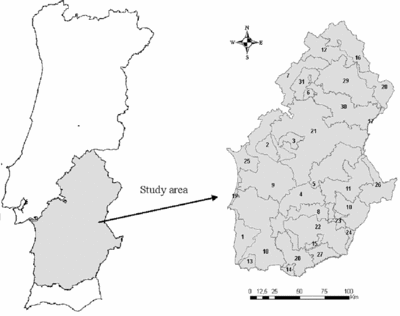
Contents
- 1 Wiki quality control
- 2 Name, responsible organisation and contact person
- 3 Software identification
- 4 Description
- 5 Concrete application
- 6 Decision support techniques used in the DSS
- 7 Support of Knowledge Management
- 8 Support of social participation
- 9 DSS development
- 10 Documentation
- 11 General System description
- 12 Data and data models
- 13 Models
- 14 Decision Support
- 15 Output
- 16 System
- 17 References
Scope of the system
The tool in its current version provides information to assess impacts of Common Agricultural Policy changes on regional land use patterns in Southern Portugal.
System origin
The system was developed in 2007/2008 by the Centre of Forest Studies of Instituto Superior of Agonomia (CEF/ISA) of the Technical University of Lisbon in the framework of Project INTERREG IIIA “Desarrollo de un sistema de información para la gestión ambiental y económica del ecosistema dehesa/montado en Extremadura y Alentejo. 2ª Fase”
AGfLOR is used by the Portuguese Ministry of Agriculture Regional Office of Alentejo (DRAPAL) to assess impacts of Common Agricultural Policy changes
on agricultural and forestry activities and on regional land use patterns over an area extending over 2 million ha.
Support for specific issues
- The system was designed so that it might support the assessment of policy alternatives on agricultural and forestry activities and on regional land use
patterns. Its current implementation provides information about impacts of Common Agricultural Policy changes on forestry, agriculture (e.g. cereals, horticulture, fruit culture fruit trees, vineyards, olive trees, permanent pastures, forage, set-aside, fallow), livestock and agro-forestry activities. Namely, it provides information about changes in area occupied by each activity, and in physical production and revenues resulting from each activity.
- The user may specify the policy changes, product prices and supply elasticity, and subsidies for each agroforestry and livestock activity to
assess its impacts on regional land use patterns.
Support for specific thematic areas of a problem type
- Development choices / land use zoning
- Policy/intervention alternatives
- Sustainability impact assessment (SIA)
- Assessment of land use patterns
- impacts of subsidies
Capability to support decision making phases
- Intelligence
The GUI helps the user to specify and input policy changes, product prices and supply elasticity, and subsidies for each agroforestry and livestock activity.
- Design
The GUI provides guidance to define simulated annealing parameters.
- Choice
The LP solver and the simulated annealing algorithm and the GUI help select policies.
- Monitor
No support is provided.
Data and data models
Typical spatial extent of application
1.The system can address both the national and international policy contexts. 2.The system uses GIS information, economic data (prices, subsides, elasticity for each agro-forestry and livestock activities) and data on policy changes. 3.The data are all entered through the GUI user interface.
The system may be used both for regional analysis. It may address both national and international policy contexts
Forest data input
The system uses gis information (vectorial) to display farm-type regional units. It further uses economic data (e.g. prices, supply elasticity, subsidies)
Type of information input from user (via GUI)
The uses inputs data on policy changes, product prices and supply elasticity, and subsidies for each agroforestry and livestock activity.
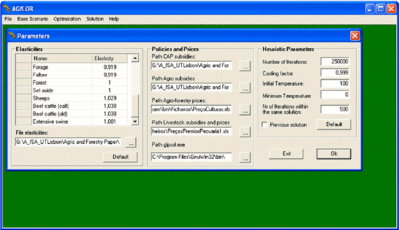
Models
A Positive Mathematical Programming model is used to calibrate mathematical programming models according to observed behaviours during a reference period. It aims to assess economic, technical and institutional scenarios associated with changes in policies, relative prices, technologies and availability of inputs.
Decision Support
Definition of management interventions
Not applicable
Typical temporal scale of application
The system addresses mostly strategic policy issues
Types of decisions supported
- Management level
- strategic decisions
- planning decisions
- command decisions
- control decisions
- coordination decisions
- decision making situation
- unilateral
- collegial
Decision-making processes and models
AGfLOR uses a linear programming model and a simulated annealing meta-heuristic.
Output
Types of outputs
Results are reported in tables and in maps.
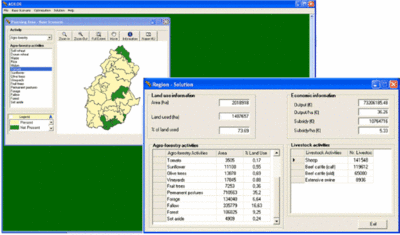
Spatial analysis capabilities
The system has spatial reporting capabilities. Yet it does not include spatial analysis functionalities. It provides standard data import/export formats (GIS, spreadsheet, relational database)
Abilities to address interdisciplinary, multi-scaled, and political issues
The system takes as inputs biophysical, economic and policy information.
System
System requirements
- Hardware requirements: 2 GHz Pentium IV, 1024 Mb of RAM, 250 Mb of hard disk, CD-ROM reader
- Operating Systems: Windows 2000, Windows XP or Windows Vista
- Other software needed: the user does not need to acquire additional software.
- Development status: completed
Architecture and major DSS components
- AGfLOR is a desktop application with a modular structure. It was developed with software Ms VB.NET.
- The system includes a MS Access 2003 relational database (BD_INTERREG_AGRÍCOLA), Ms Excel 2003 spreadsheets, an LP matrix generator, a simulated annealing module and a report generator. It further includes freeware (GIS and LP solver). A GUI ties all modules together to provide the user-schema.
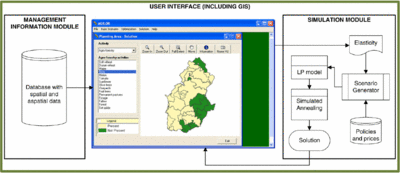
Usage
Government use (Portuguese Ministry of Agriculture Regional Office of Alentejo (DRAPAL))
Computational limitations
Run time is impacted mostly by the number of farm types, agroforestry activities and simulated annealing parameters.
User interface
AGfLOR has a standard Windows GUI. Thoughtful use of the system requires some forest management planning and agricultural economics background.
Documentation and support
The graphical user interface provides access to the AGfLOR users' manual:
Borges, P., J. G. Borges e S. Marques. 2007, Manual de Utilização Sistema de Apoio à Decisão AGfLOR Documento Técnico n.º 07/07, Grupo de Economia e Gestão dos Recursos Naturais, Lisboa , Portugal
Installation
Simple Windows guided installation.
References
Cited references
- ↑ Borges P.J., Fragoso R., Garcia-Gonzalo J., Borges J. G., Marques S. and Lucas, M.R. 2009. Assessing impacts of Common Agricultural Policy changes on regional land use patterns with a decision support system. An application in Southern Portugal. Forest Policy and Economics, doi: 10.1016/ j.forpol.2009.09.002
- ↑ Borges P.J., Fragoso R., Garcia-Gonzalo J., Borges J. G., Marques S. and Lucas, M.R. 2009. Assessing impacts of Common Agricultural Policy changes on regional land use patterns with a decision support system. An application in Southern Portugal. Forest Policy and Economics, doi: 10.1016/ j.forpol.2009.09.002
- ↑ Borges P.J., Fragoso R., Garcia-Gonzalo J., Borges J. G., Marques S. and Lucas, M.R. 2009. Assessing impacts of Common Agricultural Policy changes on regional land use patterns with a decision support system. An application in Southern Portugal. Forest Policy and Economics, doi: 10.1016/ j.forpol.2009.09.002
- ↑ Borges P.J., Fragoso R., Garcia-Gonzalo J., Borges J. G., Marques S. and Lucas, M.R. 2009. Assessing impacts of Common Agricultural Policy changes on regional land use patterns with a decision support system. An application in Southern Portugal. Forest Policy and Economics, doi: 10.1016/ j.forpol.2009.09.002
